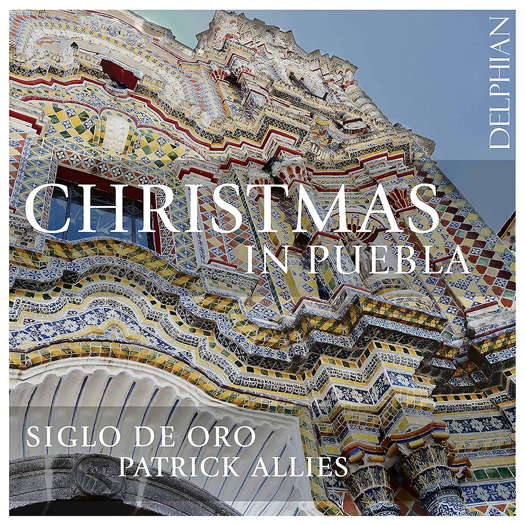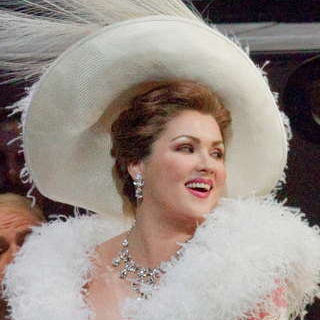 FEEDBACK: She said WHAT? Read what people think about our Classical Music Daily features, and have your say!
FEEDBACK: She said WHAT? Read what people think about our Classical Music Daily features, and have your say!

A Real Adventure
Christmas in seventeenth century Mexico, conjured up by Siglo de Oro, Patrick Allies and friends, greatly impresses KEITH BRAMICH
'Siglo de Oro's performances here are superbly well-blended, joyously fresh and optimistic, seemingly flowing over and through the listener, sweeping them along in a stream of Mexican-tinged Renaissance splendour.'
One of the most fascinating aspects of our planet's musical history is the effect of migration on changing musical styles. As we know all too well from our experiences this year, travel and migration during some periods in history have been easy, and at others, nearly impossible. Early in the seventeenth century, travel from Europe to South America would have been challenging and most likely a real adventure. That travel would also have been easy to organise, though, as Habsburg Spain had been busy for a century or more, colonising the Americas and creating Nueva España, its wealthy outpost which later became Mexico.
This CD is based around an incomplete Mass setting by Spanish Renaissance composer, music director and instrument maker Juan Gutiérrez de Padilla (1590-1664) who, when he was about thirty years old, left Spain for what is now Mexico, in search of new opportunities. He spent the last four decades of his life working in Puebla Cathedral in east-central Mexico, where he became maestro de capilla.
Patrick Allies' carefully researched and planned CD, dating from sessions in London at the very beginning of this year, includes the first recording of Padilla's Missa Joseph fili David, arranged for choir and chamber ensemble, with the sections of the Mass separated by other music, perhaps as it may have been performed liturgically.
Siglo de Oro's performances here are superbly well-blended, joyously fresh and optimistic, seemingly flowing over and through the listener, sweeping them along in a stream of Mexican-tinged Renaissance splendour.
Listen — Juan Gutiérrez de Padilla: Credo (Missa Joseph fili David)
(track 9, 4:22-5:21) ℗ 2020 Delphian Records Ltd :
There's also music here by several other, mainly little-known composers associated with Puebla. Juan García de Zéspedes (c1619-1678) was taught by Padilla and sang in his choir in Puebla. Francisco de Vidales (1632-1702) and Francisco López Capillas (1614-1674) both served as organists at Puebla Cathedral.
Listen — Francisco López Capillas: Cui luna, sol et omnia
(track 14, 1:08-1:52) ℗ 2020 Delphian Records Ltd :
Then there's Padilla's predecessor, Gaspar Fernandes (1566-1629), born in Portugal, who worked in Guatemala as an organist and organ tuner before being recruited as chapel master at Puebla. His fascinating cross-cultural villancico Tleycantimo choquiliya combines Spanish words with those in the Aztec language Nahuatl.
Listen — Gaspar Fernandes: Tleycantimo choquiliya
(track 17, 1:24-2:09) ℗ 2020 Delphian Records Ltd :
Seemingly unconnected with Mexico is the Catalan musician and Benedictine monk Joan Cererols (1618-1680), whose Serafín que, con dulce harmonía features here because of the parallels Patrick Allies identifies with the Mexican music on this recording.
Listen — Joan Cererols: Serafin que, con dulce harmonía
(track 11, 0:02-1:02) ℗ 2020 Delphian Records Ltd :
Also without a Mexican connection is the only well-known composer featured here - Giovanni Pierluigi da Palestrina (c1525-1594), who pre-dates the other composers performed here. An Agnus dei from Palestrina's Missa O Admirabile commercium is used here because Padilla's Mass has no Agnus dei. Patrick Allies' four pages of fascinating and detailed notes indicate that it may have been a local custom to omit the Benedictus and Agnus dei sections of the Mass, and also that it's likely that Palestrina's music was performed in Puebla.
The Christmas theme can be explained by going back to Juan Gutiérrez de Padilla, whose Mass is based on his eight voice motet Joseph fili David, also given its first recording here. Joseph, one of Puebla's patron saints, is visited by an angel to calm him down and persuade him to marry the pregnant Mary, in this text from St Matthew for the Vigil of the Nativity.
Listen — Juan Gutiérrez de Padilla: motet Joseph fili David
(track 3, 0:01-1:01) ℗ 2020 Delphian Records Ltd :
Guided by contemporary scholarship, this disc attempts to re-create seventeenth century Christmas celebrations in Puebla. Much of the detail can only ever be guesswork. Guitars, for example, are included in the ensemble, as the cathedral owned them, and the percussion instruments on the recording are known to have been in use in South America during this period. The result, however achieved, is vibrant, lively and fascinating.
Copyright © 21 December 2020
Keith Bramich,
Worcestershire, UK

CD INFORMATION: CHRISTMAS IN PUEBLA




